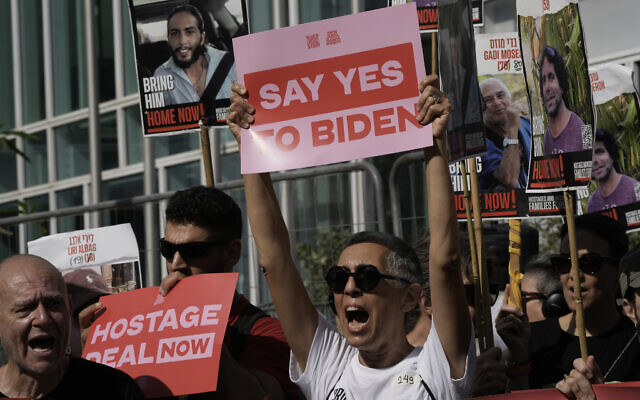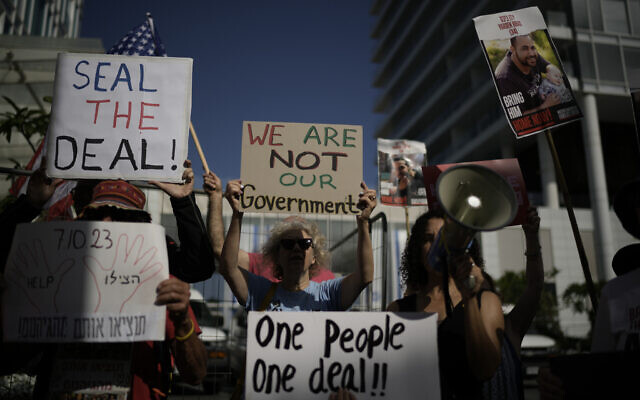



US Secretary of State Antony Blinken harshly criticized Hamas’s response to Israel’s hostage deal proposal on Wednesday, saying it included some changes that were impractical and suggesting the terror group will be responsible for prolonging the war if it sticks to its current positions.
“Hamas has proposed numerous changes to the proposal that was on the table… Some of the changes are workable, some are not,” Blinken said in what was the first US reaction to Hamas’s response submitted a day earlier.
Speaking at a press conference with Qatari Prime Minister Mohammed bin Abdulrahman Al Thani in Doha, Blinken reiterated that the Israeli proposal Hamas received on May 30 was “virtually identical” to the terror group’s own last offer submitted on May 6.
“Hamas could have answered with a single word: ‘Yes.’ Instead, Hamas waited nearly two weeks and then proposed more changes — a number of which go beyond positions that had previously taken and accepted,” Blinken said.
“As a result, the war — [which] Hamas started on October 7 with its barbaric attack on Israel… will go on,” the top US diplomat said.
He did not explicitly characterize the Hamas paper as a rejection, as Israel did on Tuesday evening, and said the mediators were still committed to bridging the gaps, even though the terror group’s position had complicated matters.
“We’re determined to try to bridge the gaps, and I believe those gaps are bridgeable. That doesn’t mean they will be bridged,” Blinken stated.
A senior Israeli official said last month that the latest offer was as far as Israel would go.
The secretary didn’t hold back his frustration with Hamas.
“At some point in a negotiation — and this has gone back and forth for a long time — you get to a point where if one side continues to change its demands — including making demands and insisting on changes on things that they had already accepted — you have to question whether they’re proceeding in good faith or not,” Blinken posited.
“It may be that Hamas continues to say ‘no.’ [Then] I think it will be clear to everyone around the world, that it’s on them and that they will have made a choice to continue a war that they started,” he said
While Blinken focused his criticism on Hamas, Qatar’s Al Thani indicated he believed steps taken by Israel over the past month had harmed efforts to secure a ceasefire.
Asked during the press conference whether Qatar should be putting more pressure on Hamas in order to reach a deal, Al Thani said pressure must be placed on both sides.
He highlighted Israel’s invasion of Rafah along with “contradicting statements from different Israeli officials” and argued that this demonstrated the need to pressure Israel as well.
Earlier in the presser, he accused Israel of advancing a policy of “collective punishment” and “starvation” in Gaza.
Pressed on whether Qatar will consider closing Hamas’s office in Doha, Al Thani reiterated that the bureau was established to create a channel of communication with the terror group.
“Until now, this reason is valid, and we are using this as a communication channel,” he said.
Blinken privately told Al Thani in April that Doha should expel Hamas’s leaders if they continue rejecting hostage deal proposals, a US official said.
Several weeks later, Qatar quietly ordered Hamas leaders to leave Doha, but then allowed them to return when hostage negotiations picked up again in May, two officials told The Times of Israel.
Hamas officials have remained in Qatar since those negotiations fell apart, but a source familiar with the matter told The Times of Israel that Doha is still prepared to formally and publicly oust Hamas’s leaders if an official request to do so is made by the Biden administration.
The US is weighing its desire to squeeze Hamas to agree to a hostage deal against its concern that the terror group could move to another country that is less swayed by Washington’s interests, the source said.
Key details of Israel’s proposal were revealed in a May 31 speech by US President Joe Biden. The offer envisions the gradual release of Israeli hostages held in Gaza and the pullback of Israeli forces over two phases as well as the freeing of Palestinian prisoners, with the reconstruction of Gaza and the return of the remains of deceased hostages in a third phase.
The key point of contention appears to be Hamas’s desire that the second phase and a transition to a permanent ceasefire be guaranteed, while Israel refuses, as its leaders say they do not intend to end the war before Hamas has been eliminated from power in Gaza.
In submitting its response to the Israeli proposal, a Hamas spokesperson acknowledged that the terror group made a series of “amendments.”
The amendments included an updated timeline for the permanent ceasefire and withdrawal of Israeli troops from Gaza — including from Rafah and the Philadelphi corridor along the Egypt-Gaza border — according to an official from one of the mediating countries who requested anonymity.
Two Egyptian security sources told AFP on Wednesday that Hamas also wants written guarantees from the United States for a permanent ceasefire and the withdrawal of Israeli forces from the Strip in order to sign off on the proposal.
Prime Minister Benjamin Netanyahu’s office did not release an on-record reply, but a statement was issued by an anonymous Israeli official who said Hamas’s response had “changed all the main and most meaningful parameters,” amounting to a rejection of the proposal on the table.
The United States has said Israel accepted the latest proposal, stressing that it was made by Jerusalem, but Israel has not publicly and clearly stated as much.
The war in Gaza has been ongoing for eight months since October 7 when Hamas launched an unprecedented attack on Israel, murdering some 1,200 people, mostly civilians, and taking 251 hostages.
The Hamas-run Gaza health ministry says more than 37,000 people in the Strip have been killed or are presumed dead in the fighting so far, though only some 24,000 fatalities have been identified at hospitals. The toll, which cannot be verified as it does not differentiate between terrorists and civilians, includes some 15,000 terror operatives Israel says it has killed in battle.



